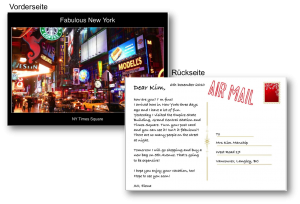Everyone is excited about it. Some think they do it already. Everyone has an opinion. But no one has a clue how it really works.
Let’s just start with the end: No one has a clue.
Any material available on the internet seems to be a mere compilation of apps, programs and ideas. Having a look at teachers, students, parents and industries, one question comes up: How do they and their attitude and believes have to change to make digital education possible?
It’s not enough to develop apps that replace worksheets. The whole concept of education has to be reconsidered! This starts with teacher trainings. Lesson give the impression not to have changed within the last 50 years. Unfortunately this is true for many schools that train German teachers after they graduate from university as digital education and e- learning seem to be a closed book. How can young teachers prepare for a radical change in education – and there is no doubt it will come – if everyone only focuses on content? Their mindset has to be changed as well: We need concepts that reveal the explicit value add of digital education and push every single student to his/her limit to get the most out of him/her. They key is context, not content: only if content is embedded in real context, e- learning gets magical!
Innovation in education is disruptive and hurts!
No one, particularly teachers (sorry, there has to be someone who says that out loud!), can stay in their comfort zone. Innovation completely changes a world – teachers should be thought leaders and not people who enjoy their spare time for 12 weeks a year! When choosing to become a teacher you have to realize that it’s hard work to be up to date. Disruption replaces the ‘old education’ by a new one and the there is no room for these teachers that everyone knows and hates. Roles will change: teachers’, students’, parents’, industry’s.
Everyone is excited about it.
There is a hype to use tablets during lessons in order to play fancy games, biology seems to be more interesting since you are able to discovering a DNA helix in 3D view or printing, interactive whiteboards are said to enhance classroom interaction, video teaching is obviously the latest craze… Digital devices give you the chance to get students’ attention and also increase their motivation. Learning cannot be more fun! – at a first glance.
Millions of dollars are invested in the field of education by the big players (Google, Apple, Microsoft) and VCs (Mark Zuckerberg, First Mark Capital New York, Sequoia Capital, etc.). Moreover numerous start ups come up with innovative ideas designed to revolutionize teaching. E- learning is one of the fast growing markets with undreamt- of possibilities and potentials.
Got it. If someone wants to increase his or her degree of hipsterness, one should at least consider to start something in e- education.
Some think they do it already.
Ongoing projects prove that e- education is in the ascendant.
LA invests $ 30 million for an iPad program (Los Angeles Unified School District‘s program) to keep up with trends – obviously without considering all expanses that are incurred with iPads. Schule Schloss Neubeuern – a private school – jumps at the chance to be the first digital school in Germany by replacing paper and pen by tablet PCs from grade 9- 12. In Cologne another school (Kaiserin Augusta Schule, a state school) introduced iPads to focus on learning rather than teaching. The Khan Academy aims at improving education and offers free videos for everyone, anywhere, anytime. Sofatutor, a German tutoring concept, advertises better grades at school and university. Their offer includes learning videos and private lessons – endless content. Coursera believes “in connecting people to a great education so that anyone around the world can learn without limits”. As top universities such as Stanford, Yale, Princeton and the Ludwig- Maximilians Universität partner Coursera this vision might become true!
Concepts such as flipped classroom, challenge based learning, Apps (Google, Apple) and Wiki for schools rule educational institutions.
Everyone has an opinion.
The only thing that can be said about all the opinions about digital education is that no one is right. Everyone is hunting for the Holy Grail.

